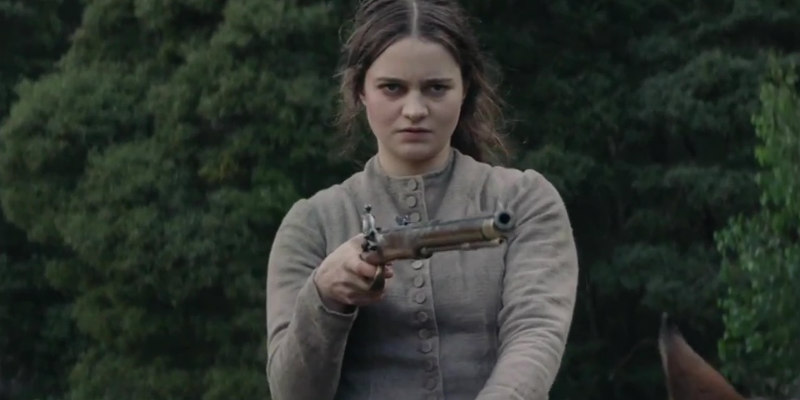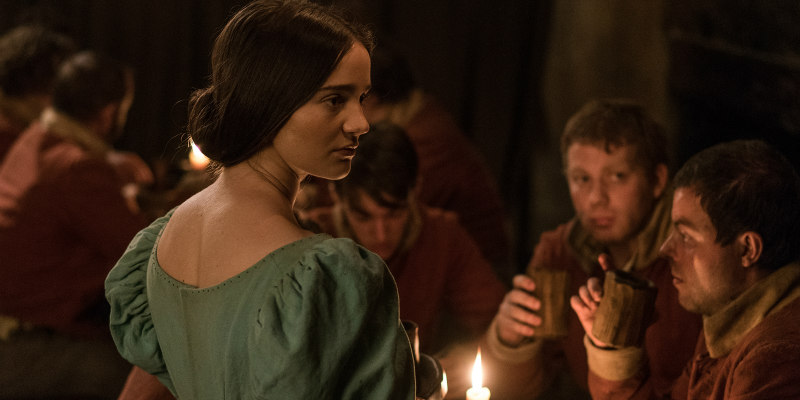
Review by
Musanna Ahmed
Directed by: Jennifer Kent
Starring: Aisling Franciosi, Baykali Ganambarr, Sam Claflin,
Harry Greenwood, Damon Herriman

Jennifer Kent is back! It's been almost five long years since her
highly accomplished debut
The Babadook. It might have even been sooner that we saw her return had she taken up
any studio offers that were sent her way, but she stuck to her guns in
focusing on her own material. While she received a deluge of scripts to
direct, it's not likely a single studio head would have said yes to her own,
The Nightingale, as one of them. This is a profoundly disturbing thriller, and the rare
period film which takes a genuinely unflinching look at colonialism.

This ruthless story takes place in Tasmania in 1825, back when it was known as Van Diemen's Land, an island inhabited by three types of people we get to know - Aboriginal Tasmanians, British colonialists and convicted criminals. 21-year-old Irish girl Clare (a bravura breakthrough performance by Aisling Franciosi) is one of the convicts, released and living with the British Army with her husband Aidan (Michael Sheasby) and their infant child. Despite being out of imprisonment, she isn't a truly free woman as Lieutenant Hawkins (Sam Claflin, too good at playing the stomach-churning villain) enslaves her for his own pleasure.
[ READ MORE: New Release Review - All We Imagine as Light ]
One night, Hawkins violently rapes Clare. Aidan discovers the marks on her
neck and makes the intentions that the family will immediately leave.
However, when they're getting ready to depart, Hawkins and his cronies, Ruse
(Damon Herriman) and Jago (Harry Greenwood), confront the
family and things brutally go south. I don't often physically flinch when
watching movies, but The Nightingale made me do just
that.

After the soldiers depart the area following this traumatising turn of events, Clare enlists the service of Aboriginal tracker Billy (Baykali Ganambarr, brilliant and sophisticated) to guide her across the valley in the pursuit of vengeance against those who took everything away from her. Billy isn't merely her personal GPS - Tasmania is his people's land, and colonialism has resulted in an ongoing ethnic cleansing and slavery of the Aboriginal population. Together, the two are driven by dark personal histories to undertake the journey through the wilderness.
[ READ MORE: New Release Review - Conclave ]
After the extremely harrowing first half hour, I expected to immediately
root for Clare to reclaim her life, as would be the case for most revenge
films. But that was tough because, when she's advised to go with Billy, her
racism and prejudices become loud and clear. So, despite her circumstances,
I was more sympathetic to Billy refusing to put trust in another white
person after witnessing the bloody violence at the hands of people who think
alike to Clare. Kent keeps our thoughts provoked with an absorbing,
painfully blunt depiction of racism, rape and murder, all stemming from the
top-down.

Where The Nightingale is further tricky regarding its audience's emotional response is in trying to be a veracious account of a vicious time period while being reminiscent of those rape-and-revenge exploitation flicks like I Spit on Your Grave. There are moments that potently reflect trauma (Clare has distressing dreams about the ordeal) but also images of squeamish violence, enough to satiate a Fantastic Fest crowd. Additionally, these images are strikingly captured in 4:3 ratio - though that'll immediately skew it towards the arthouse in the eyes of a mainstream horror audience.
I'm still not entirely sure on which side of the threshold I feel
The Nightingale ultimately stands on, but what I am sure about
is that it left an indelible impression on me as the most matter-of-fact
depiction of colonialism I've ever seen, with top-drawer craft and
performances. For that, I think it's a necessary work of art.

The Nightingale is on MUBI UK
now.
